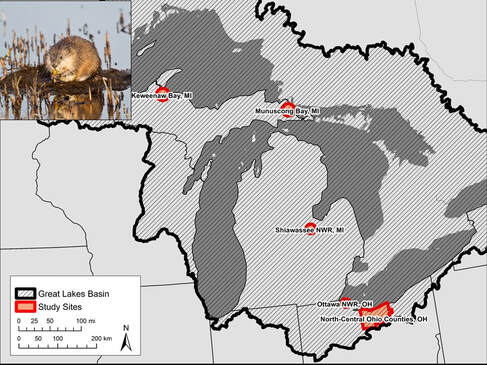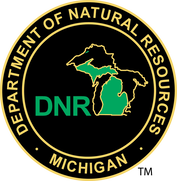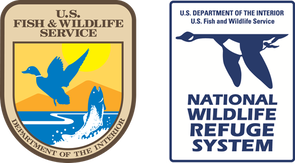Evaluating the Impact of Wetland Quality and Drought on Muskrat Populations in the Great Lakes Basin (Phase II)
Phase II (2022-2025) of our project is underway! To check out our completed Phase I, Click Here.
Muskrats are ecosystem engineers and their activities have benefits to many other wetland wildlife species. Wetlands have undergone substantial changes and declines in North America, and there is strong evidence that muskrat populations are experiencing substantial declines across their geographic distribution, including in the Great Lakes Basin of the northcentral U.S. Results from our Phase I project included that there are at least two underlying drivers of muskrat population dynamics in the Great Lakes Basin: vegetative disturbance withing wetlands, and multi-year drought conditions.
For Phase II, we are building upon the foundation of Phase I, but also other research. With our project partners, our field-based investigation of regional population declines is focused on assessing health (e.g., toxicology, lipid and protein analysis), disease risk, reproduction, population structure, and other factors to determine the mechanism behind these widespread population declines. This landscape-scale approach promotes continued development of science-based indicators that should be useful for wetland-management plans, possibly extending to management beyond the Great Lakes Basin.
Muskrats are ecosystem engineers and their activities have benefits to many other wetland wildlife species. Wetlands have undergone substantial changes and declines in North America, and there is strong evidence that muskrat populations are experiencing substantial declines across their geographic distribution, including in the Great Lakes Basin of the northcentral U.S. Results from our Phase I project included that there are at least two underlying drivers of muskrat population dynamics in the Great Lakes Basin: vegetative disturbance withing wetlands, and multi-year drought conditions.
For Phase II, we are building upon the foundation of Phase I, but also other research. With our project partners, our field-based investigation of regional population declines is focused on assessing health (e.g., toxicology, lipid and protein analysis), disease risk, reproduction, population structure, and other factors to determine the mechanism behind these widespread population declines. This landscape-scale approach promotes continued development of science-based indicators that should be useful for wetland-management plans, possibly extending to management beyond the Great Lakes Basin.
|
Our project schedule includes:
Summer 2022, 2023, and 2024: Field-data collection of wetland vegetation, hut-count surveys, and other wetland characteristics. Fall-Winter 2022-2023, 2023-2024, and 2024-2025: Work with trappers on our study sites to collect muskrat and mink carcasses to analyze for health, disease, and other factors associated with these wetland species. Spring 2023, 2024, and 2025: Process muskrat and mink carcasses and analyze those data. We are working across a gradient of wetland habitat quality and multi-year drought conditions in the Great Lakes Basin.. Generally, Wetland conditions are more pristine in the northern versus the southern portion of the Basin. Our specific study sites range from the Michigan Upper Peninsula to wetlands within northern Ohio. |
This project could not be successful with an ongoing collaboration with our critical project partners, including state, tribal, and federal agencies; trappers; other NGOs; and many others.
Project Partners
Copyright 2024 Wildlife Ecology Institute





